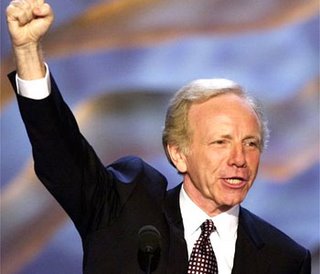I spent part of last night typing a lengthy, digressive metapost about Joe Lieberman's loss, the kind of several-thousand-word stemwinder (read: sleep-inducer) that I liked to write in this site's first few months, but which have been rare in 2006.
Then I had a brief e-mail exchange with a friend that summed up my feelings without blathering about New Deal liberals and the good intentions of traditional neoconservatives.
What I wrote, slightly revised:
You're probably not surprised to hear that I'm pleased with what happened in Connecticut last night. As soon as Lieberman conceded, I donated $250 to Ned Lamont.
I consider Lieberman to be one of the "extremists" that you find troubling. Whether it has been his callous and reckless views on Iraq, his support of federal intervention in continuing Terri Schiavo's life support, or his insensitive comments concerning rape victims and contraceptive access, I do not view him as a moderate.
Add his tacit support of bankruptcy reform and Justice Alito -- not to mention his self-anointed role as national scold and arbiter of American cultural values -- and it's clear that he is not a voice of moderation, but one of big government at its worst (regulating individual conduct) and economic libertarianism at its most destructive (when it benefits major corporations).
That this could be framed as "moderation" shows how far to the right that this country has lurched.
And yet, on a human level, I find his downfall poignant. The narrative is kind of heartbreaking. Like others before him -- Nixon and McNamara, Henry Wallace and Woodrow Wilson -- his self-perpetuated collapse is the stuff of Shakespearean tragedy. Here was a man who had greatness in his reach but was unable to concede any flaws or see beyond his hubris. A simple, "I may have been wrong, and if I went too far, I'm sorry and will try to be more open," would have placated many of his opponents, including me. Yet rather than soften his rhetoric, or do more than give cursory acknowledgement to the concerns that fueled his opposition, he has retreated into paranoia and distortion. This campaign slowly turned into an agonizing, daily drama of a man out of step with the world around him. How did he fall so far, so quickly? Was it a sincere belief in his positions? The insulation experienced by a longstanding insider? The adulation of national press? A deeply embedded sense of self-righteousness? I don't have any answer but what's become of him should be a cautionary tale to all elected officials.
As the U.S. continues to work out a way of negotiating the world after 9/11 and Bush's Iraq fiasco, Lieberman may be the first of at least a handful of politicians, both left and right, unable to reconcile certain longstanding assumptions with a changing political environment. It speaks less to a decline in bipartisanship than to the disorientation caused by Iraq, Bush's overreaching and a motivated electorate. The right analogies aren't to 1994 but to post-Vietnam/Watergate.
Subscribe to:
Post Comments (Atom)


No comments:
Post a Comment